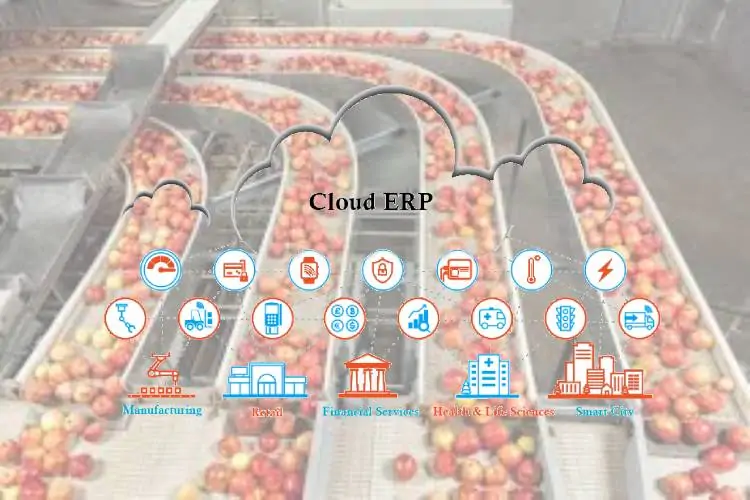Cloud ERP’s popularity has grown as a result of this expansion across sectors, making it the next big thing. When it comes to food processing, the cloud-based ERP system has had a major impact on operational efficiency.
As the years have passed, the pace of technological advancement has accelerated, resulting in revolutionary developments. Since its inception in 1972 through the release of the first cloud computing-based ERP system in 1998, ERP technology has continually evolved with newer, more inventive structures and procedures.
Pros of Cloud Computing
For those who aren’t already aware, cloud-based solutions make it possible for you to access your data from any device. This implies that you no longer have to rely on operating systems that are located on the premises.
You can view all of your company’s data from any location at any time using a cloud-based platform. As a result, you and your company will be able to work wherever your job takes you, with the capacity to access your most important data.
This format is becoming more important for ERP since organizations need to access their data from different geographic areas at the same time.
Also Read: The Need for Food ERP in Food Manufacturing
Benefits of Cloud ERP in the Food Industry
Potential for New Ideas
Cloud-based food ERP system makes modifications without compromising the software’s ability to operate. It also assures the maintenance of the final product quality, despite the increase.
Inventory Accuracy
Every company in the food and beverage business has to deal with inventory accuracy issues.
Inventory management is a major concern since many of the materials, particularly in the processing units, are highly perishable. In the food production business, a cloud-based ERP system allows quicker and more precise traceability of ingredients.
It also allows simpler allocation upstream and downstream. In addition to saving money by avoiding the need to store inventory, precise monitoring of perishable commodities avoids food waste and delays caused by out-of-of-stock materials.
Mitigate Risks and Improve Security
There are several laws and regulations issued by food regulating authorities like the FDA that must be followed. ERP systems for food and beverage companies are cloud-based. It include HACCP, FSMA, and other regulations, allowing for proper compliance and reducing risks. Service providers handle the data security and server maintenance in this arrangement. They lower the cost and risk load of protecting data.
Reduced Costs
A cloud-based food production ERP system has comparably reduced costs since it does not need hardware for computer systems. There is no need for in-house IT assistance for the food ERP system because all IT concerns are handled by the software vendor in the data center.
Drivers of Tomorrow’s ERP
Automation
Changes to your business processes may now be implemented much more quickly, thanks to application automation. Preparing for changes would be a breeze with tomorrow’s ERP systems because of their easy automation features. Thanks to cloud computing, we no longer have to go around in circles!
The advent of ERP technology has sped up the decision-making process in today’s competitive company climate. As a result of their impatient nature, companies grow and survive. Users of today’s corporate software expect much more than they did in the past, with up-to-date information available at the press of a button.
A high-speed connection across many servers, locations, and data devices would be required for the ERP of the future. It is allowing for faster access to key corporate information while assuring total data correctness.
Improved Compatibility
Due to an increase in the need for more flexible business solutions, ERP’s future will necessitate even closer integration with customer service, human resources, procurement, and other business processes. Businesses that have more integrated operations and processes will be able to close the gap between their various operations and processes.
More and more firms will want to mix CRM and ERP into a single unified system to achieve the best possible customer engagement and corporate resource management, for example.
Simplicity in the Cards
Get ready for ERP systems that are simple to use and comprehend, with clean and uncluttered interfaces that save training time by a substantial amount. The future of ERP technology will be dominated by simple, dependable, and redundant ERP systems.
Future of Cloud ERP
There are always new features and improvements to Cloud ERP that make it even more efficient than before. A considerable number of small and medium-sized businesses (SMBs) have adopted this technology.
According to analysts, the system may combine disruptive technology such as artificial intelligence and machine learning, significantly improving the whole process of cloud ERP. This might be a game-changer for the food sector.
Food producers need to be more efficient to remain in business and succeed. Since pricing or product distinction distinguishes the greatest food producers from others, cloud ERP is a popular commodity in the food production business. ‘Cloud-based ERP’
Final Thoughts
We should expect a major transformation in the capabilities of current ERP systems as a result of this development in technology.
Furthermore, since the norms of business continue to change at a breakneck pace, ERP systems are rapidly becoming a key component to drive efficiency, productivity, intelligence, and profitability.
It’s safe to say that ERP of the future won’t be a tool in and of itself. It rather a companion for its users, at their side throughout all of their business operations.
